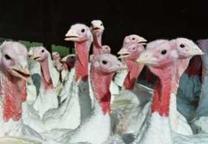Soy protein concentrate in turkey diets

Polish researchers investigated the physiological and growth response of young turkeys (up to 8 weeks of age) to dietary replacement of soybean meal (SBM) by soy protein concentrate (PC) or protein isolate (PI).
α-galactosides
This replacement resulted in a differentiated dietary concentration of α-galactosides of over 2.5% in the SBM diet, approx. 2% with a mixture SBM and PC, 1% with a PC diet and 0.1% with a PI diet.
Methods
Each treatment was applied in 2 ways: with lower (3.5%) or higher (5.3%) dietary crude fibre content, made by supplementation with soybean hulls.
The highest and lowest body weight of turkeys was recorded both after the first and second 4-week half of the study in the PC and PI-type diets respectively.
Results
A gradual withdrawal of α-galactosides from a diet was accompanied by a decline in ileal tissue mass, ileal viscosity and activity of endogenous maltase (the latter was found to be significant at 4 weeks of age).
At the same time, 2-way anova revealed that an elevated level of crude fibre (HF treatment) caused an increase in ileal tissue mass (p < 0.05 after 4 weeks of feeding) as well as a decrease in activity level of intestinal sucrase and maltase.
The presence of raffinose family oligosaccharides in a diet, in contrast to dietary crude fibre level, significantly affected the caecal metabolism. The rate of bacterial production of short-chain fatty acids in the caeca was distinctly diminished by dietary withdrawal of α-galactosides.
Conclusion
The soy protein concentrate, in contrast to the protein isolate preparation, exerted positive effects on the turkeys’ growth and gastrointestinal tract physiology and should be considered as an effective SBM substitute.
The full article can be obtained from the Journal of Animal Physiology and Animal Nutrition












